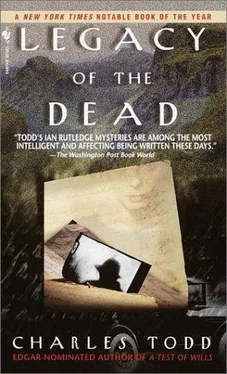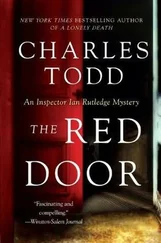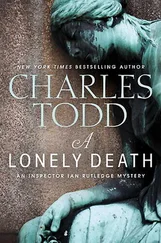Charles Todd - Legacy of the Dead
Здесь есть возможность читать онлайн «Charles Todd - Legacy of the Dead» весь текст электронной книги совершенно бесплатно (целиком полную версию без сокращений). В некоторых случаях можно слушать аудио, скачать через торрент в формате fb2 и присутствует краткое содержание. Жанр: Полицейский детектив, на английском языке. Описание произведения, (предисловие) а так же отзывы посетителей доступны на портале библиотеки ЛибКат.
- Название:Legacy of the Dead
- Автор:
- Жанр:
- Год:неизвестен
- ISBN:нет данных
- Рейтинг книги:5 / 5. Голосов: 1
-
Избранное:Добавить в избранное
- Отзывы:
-
Ваша оценка:
- 100
- 1
- 2
- 3
- 4
- 5
Legacy of the Dead: краткое содержание, описание и аннотация
Предлагаем к чтению аннотацию, описание, краткое содержание или предисловие (зависит от того, что написал сам автор книги «Legacy of the Dead»). Если вы не нашли необходимую информацию о книге — напишите в комментариях, мы постараемся отыскать её.
Legacy of the Dead — читать онлайн бесплатно полную книгу (весь текст) целиком
Ниже представлен текст книги, разбитый по страницам. Система сохранения места последней прочитанной страницы, позволяет с удобством читать онлайн бесплатно книгу «Legacy of the Dead», без необходимости каждый раз заново искать на чём Вы остановились. Поставьте закладку, и сможете в любой момент перейти на страницу, на которой закончили чтение.
Интервал:
Закладка:
“A bloody circus!” Hamish put in.
“Then I’m telling you it’s not on! I see no purpose to be served,” Oliver said angrily.
McKinstry came through the door to the dining room and stood scanning the tables until he saw Oliver.
He crossed quickly to Oliver’s side, bent over, and said quietly, “You’d better come, sir. There’s a message from the police in Glencoe.”
“I’ll be there in a quarter of an hour. Damn it, can’t you see I’m in the middle of my lunch!”
“Yes, sir.” McKinstry straightened and started for the door.
Oliver threw his serviette in his plate and got up, swearing under his breath.
Rutledge was finishing his flan. He started to follow, but Oliver motioned him back into his chair.
“No, this is my end of things.”
Rutledge acknowledged his barely veiled order and stayed where he was. It never paid to argue jurisdiction with the local man, even when you were in the right.
Hamish said, “He’s no’ finished what was on his chest.”
“Just as well,” Rutledge retorted. For an instant he thought he had spoken the words aloud.
Ten minutes later Oliver was back. His face was grim.
“They’ve found something up the glen. We’re on our way. Where’s your motorcar?”
Rutledge explained.
Oliver nodded. “Well, you’d better come along, then. You’ll want to hear what’s said.”
Torn between duty and dread, Rutledge slowly got to his feet.
Glencoe had a long and dark history. The bloody massacre there on 13 February 1692, had left its mark in the very ground. And the great bulge of mountains that overshadowed the valley below seemed to hold a long and bitter memory in their barren rock.
MacIan of Glencoe had failed to take his oath to the King, William of Orange, by 1 January of that year. It wasn’t his fault; he had reached Fort William in time, but there he had been sent on to Inveraray. Still, a punishment was held to be in order.
Campbell soldiers were quartered on the MacDonalds.
The Campbells had lived peacefully for twelve days in MacDonald homes and eaten their bread and salt. Then, without warning on that dark, cold February night, the soldiers had risen from their beds and slaughtered men, women, and children indiscriminately. Those who escaped died of cold and hunger and wounds in the bleak, unforgiving hills. And for the handful of survivors, the name of Campbell was ever after anathema.
As Oliver’s motorcar passed Loch Leven and took the road south of the river that led into the heart of the glen, Rutledge could feel the press of time and anguish, just as he felt Hamish’s unspoken grief. He wished fervently that he hadn’t come. He’d planned to drive here with Fiona; he’d seen her as his shield against the glen, but he knew now, beyond question, that it would have been wrong then just as it was wrong now.
Even Fiona couldn’t protect him from the images in his own mind.
Not far from here, Hamish had been born, grew to manhood, and went off to war. This was land he knew so well, he had described nearly every inch of it to Rutledge the night before he died. It wasn’t imagination that peopled the great empty glen with memories, it was the stored knowledge of a lifetime. And the lasting voice of a soldier who had spoken softly in the candlelight but tellingly, the noisy darkness around the small makeshift hut they sat in notwithstanding, until Rutledge could have recited each and every word in his dreams.
As the miles rolled behind them, Rutledge relived that night with such ferocity that he was back again in 1916, even as he saw every turn of the road.
After a fashion, Hamish had come home.
19
It was a long drive. By the time they had reached the rendezvous point where an Inspector MacDougal was waiting for them, Oliver and McKinstry had fallen into weary silence, and Rutledge, sharing the rear seat with Hamish, was racked by the tension. It was not, by any token, an easy homecoming for either man. Rutledge had never expected to see and recognize landmarks that stood out now with such clarity. Nor had he expected to find here such a barrenness that in itself was beauty to someone who had seen it every day until the death of an obscure Austrian archduke had tumbled the world into war.
Glencoe was haunting-and haunted.
Ahead, where the unpaved road entered a narrow neck of the glen, they could see a motorcar pulled off to one side, under the frowning slopes. A man climbed down from the driver’s seat as they approached.
He was square, with flame-red hair and freckles so thick he seemed to be deeply tanned. Grinning at them, he raised a hand and called as Oliver slowed down, “Have ye brought the entire force from Duncarrick, then?”
Oliver pulled his vehicle off the road behind the other motorcar, raising a thick cloud of dust. The only traffic they had seen for miles was a flock of sheep and several carts piled with cabbages and sacks of potatoes. The road in either direction snaked yellow in the sun, like a dry river.
Solitary. But not empty. This place was never empty if you knew its history. Hamish, who did, was silent in the face of it. Rutledge thought, if ever there was a place for the pipes, it was here. Keening a lament on the wind and filling the valley with human sounds to shut out those no one could quite hear.
He forced himself to concentrate. Introductions out of the way, MacDougal went back to his own vehicle to open the door for the passenger he had brought with him.
She was no more than fourteen or fifteen, wrapped against the chilly wind that was blowing down from the heights in a faded plaid shawl that reached her hips. Her skirts whipped and snapped about her ankles. Her hair, in a bun, was a mousy brown, and youth was all that made her pretty.
But she faced the strangers as they were introduced in their turn and seemed to be collected for someone her age.
“And this is Betty Lawlor,” the Inspector ended. “Right, shall I begin, or will you, Inspector Oliver?”
Rutledge said before Oliver could speak, “Do you know the MacDonalds up the glen-” He dredged his memory for a name, and Hamish supplied it.
“-kin of Duncan MacDonald, who died in 1915?”
Betty gave him a sour look. “Aye. I ken who they are.”
“Are you friends, then?”
“Not friends, no.”
“Did you know Duncan’s granddaughter, Fiona?”
“I did. Not well. She was older. My sister’s age.”
Rutledge looked around him at the great expanse of emptiness. “I should think that neighbors here might look out for one another.”
Betty stared at him. “My ain grandfather was transported to Australia for sheep stealing. I havena’ any dealings with the MacDonalds. It was their sheep.”
Rutledge nodded. Oliver, impatient, said abruptly, “What did you find up there, Miss Lawlor?” He pointed to the mountainside above them, a great bulge of rock that seemed top-heavy.
“I was walking up there one day and saw something shining in the sunlight. I picked it up. It was this.”
She extended a work-worn hand and in the palm lay a small brooch. Rutledge and Oliver stepped forward to look at it more closely.
It was oval, with a single stone in the center and around it a circlet of smaller stones, set like the petals of a flower. On the back was a simple pin to hold it closed.
The color of the stones was a smoky brown. Smoky quartz.
“A cairngorm.” Hamish said it before Oliver did.
A stone found in Scotland and popular for jewelry. In the hilt of a skean dhu, in the froth of lace at the throat in eighteenth-century portraits, adorning the necks and fingers of ladies, it was a symbol in its way of the Highlands.
The setting was gold, a dainty filigree.
Читать дальшеИнтервал:
Закладка:
Похожие книги на «Legacy of the Dead»
Представляем Вашему вниманию похожие книги на «Legacy of the Dead» списком для выбора. Мы отобрали схожую по названию и смыслу литературу в надежде предоставить читателям больше вариантов отыскать новые, интересные, ещё непрочитанные произведения.
Обсуждение, отзывы о книге «Legacy of the Dead» и просто собственные мнения читателей. Оставьте ваши комментарии, напишите, что Вы думаете о произведении, его смысле или главных героях. Укажите что конкретно понравилось, а что нет, и почему Вы так считаете.












